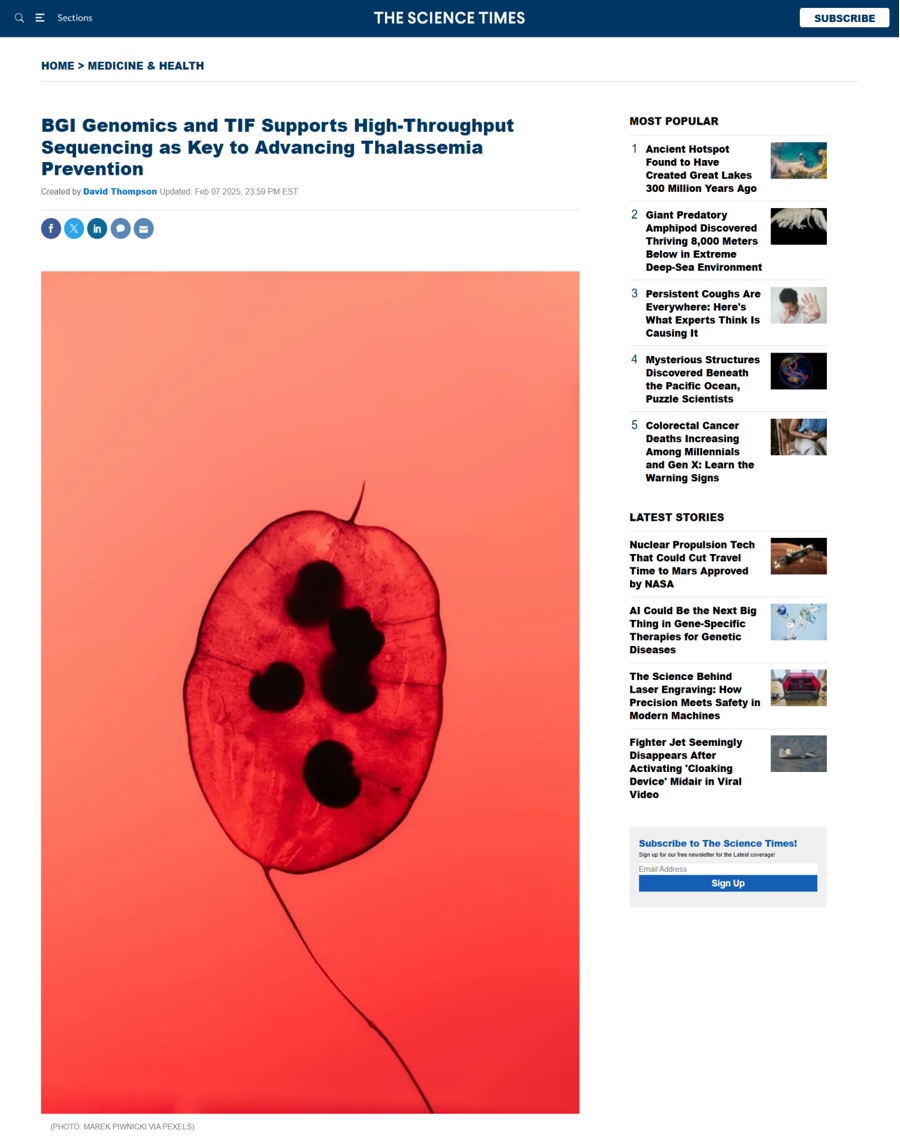BGI Genomics and TIF Supports High-Throughput Sequencing as Key to Advancing Thalassemia Prevention | The Science Times
2025-02-12

In a recent feature by The Science Times, BGI Genomics and the Thalassemia International Federation (TIF) were highlighted for their joint webinar on thalassemia prevention. The discussion focused on the role of high-throughput sequencing (HTS) in improving early diagnosis, reducing misdiagnosis, and enhancing screening efficiency worldwide. Experts from multiple countries shared insights on the latest advancements in genetic testing and its impact on thalassemia management. Read the full coverage below.
The Thalassemia International Federation (TIF) and BGI Genomics gathered at a webinar on thalassemia prevention to discuss advances in the condition's diagnosis using high-throughput sequencing (HTS) genetic testing.
Thalassemia is a blood disorder that reduces the body's ability to produce hemoglobin, which is used by red blood cells to carry oxygen throughout the body. This condition causes a significant health burden across the world, particularly in Southeast Asia, the Mediterranean, and parts of Africa. As Professor Sakorn Pornprasert of Chiang Mai University described, with 800,000 annual births, over 4,200 babies could be born with severe conditions, resulting in an estimated societal cost of $612 million USD over their lifetimes.
When treating thalassemia, many countries struggle with low screening rates and high misdiagnosis risks, leading to increased healthcare costs and delayed treatment. In recent years, HTS genetic testing has become an emerging diagnostic method for the condition due to its high accuracy, speed, and cost-effectiveness.
Speaking about this issue, Dr. Peng Zhiyu, vice president of BGI Genomics, explained that HTS-based genetic testing offers a significant improvement over conventional hematological analysis, which often requires multiple blood tests and clinic visits and may still fail to detect uncommon gene mutations. HTS provides more accurate screening results, reducing false negatives and improving prenatal diagnosis. Furthermore, Dr. Peng stated that HTS improves carrier and at-risk couple identification without added costs compared to traditional methods.
Other experts on the panel also supported HTS's effectiveness. Dr. Dina Garniasih from Indonesia's Harapan Kita Hospital reported improved outcomes after integrating HTS into their testing protocol, while Professor Zhu Baosheng from China's Yunnan Province emphasized HTS's superior accuracy over traditional methods.
Given the high interest within the medical community, BGI formed an international academic consortium for thalassemia prevention, currently spanning China, Thailand, Malaysia, Indonesia, and Vienna. The consortium offers free pilot project implementation, training programs, and HLA typing services, having completed 20,000 tests across 7,000 families.
Finally, Dr. Michael Angastiniotis, Medical Advisor at TIF, underscored the importance of public education in thalassemia prevention. He also noted that many thalassemia-prevalent countries face blood donation shortages, creating additional challenges for transfusion-dependent patients.
Read more:
High-throughput Sequencing Technology Accelerates Global Thalassemia Prevention | TIF Webinar Recap